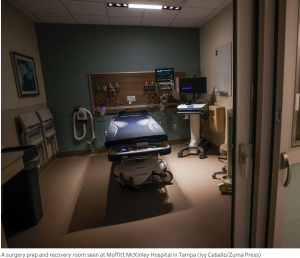The Covid pandemic disrupted healthcare in many ways. Millions of people were unable to get the routine healthcare they needed because Covid fears and restrictions made it harder than ever to see a doctor. This resulted in the postponement of many elective procedures and routine medical screenings. The full impact of the Covid pandemic went way beyond the number of lost lives to Covid and the many hospitalized people who recovered. Many undiagnosed cancers , diabetic conditions, and heart disease led to many more deaths beyond Covid.
But now the pandemic is over, how is healthcare being impacted today?
Health insurers, who didn’t have to cover the myriad elective procedures that were postponed, braced themselves for the pent-up demand when the pandemic was over. But it seems their fears of elevated costs were not only prophetic, they were underestimated.
David Wainer, writing for The Wall Street Journal, tells us the return to care for things like knee and hip replacements surprised investors and insurers. Insurance companies thought they finally had a handle on things as 2023 progressed, but news from UnitedHealth and Humana about medical costs in the fourth quarter surprised investors, underscoring that a heightened demand for medical care is failing to abate. Humana recently flagged higher-than-expected costs in the fourth quarter, due to hospital admissions, members’ doctor visits, outpatient surgeries and use of supplemental benefits.
That came after UnitedHealth told investors last week that medical costs came in higher than analysts had expected. UnitedHealth said the medical-service use was largely a continuation of issues it previously flagged, including higher use of outpatient cardiac and orthopedic procedures by people enrolled in its Medicare Advantage plans.
This led to top stock-market movers telling the story of the winners and losers from the return-to-healthcare trade as the year gets underway. At the bottom of the losers column are insurers like Humana, CVS Health, Elevance, UnitedHealth, Centene and Molina—all payers. At the top of the gainers list are hospital chains like Tenet Healthcare and HCA Healthcare as well as medical device companies like Intuitive Surgical.
This is no surprise for anyone who has been following the impact of ObamaCare since it was passed by Congress in 2010 and implemented in 2014. Hospitals have been among the biggest winners since the government is now paying for healthcare they used to write-off for indigent care. Many of those who were formerly indigent now have ObamaCare or Medicaid due to wider eligibility criteria. Hospitals are also winning because of the influx of many physicians on their employee rolls that were formerly private practitioners.
These doctors are now performing routine medical office procedures, like EKGs, EMGs, kidney stone ultra sounds, and others under the billing codes of hospitals, which allow higher charges. The up-charges for hospitals can be greater than 100 percent. This explains the incentive for hospitals to acquire private practices, which is happening nationwide. Today, more than half, perhaps as much as 70%, of all doctors work for hospitals or other large corporate healthcare institutions.
If you’re an investor, you should be avoiding insurance companies with higher medical utilization, and favoring the medical providers over the payers. Just look around any growing city and you’ll notice many of the hospitals are expanding, constructing bigger and fancier buildings with their new-found earnings. They’re the real winners in the healthcare market today.


